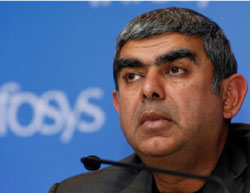Monday Feb 24, 2025
Monday Feb 24, 2025
Tuesday, 22 August 2017 00:53 - - {{hitsCtrl.values.hits}}
 Bengaluru/Mumbai (Reuters): Vishal Sikka, the chief executive brought in to turn around India’s Infosys three years ago, resigned on Friday, blaming a “continuous drumbeat of distractions” and a long-running row with the founders over company strategy.
Bengaluru/Mumbai (Reuters): Vishal Sikka, the chief executive brought in to turn around India’s Infosys three years ago, resigned on Friday, blaming a “continuous drumbeat of distractions” and a long-running row with the founders over company strategy.
Sikka’s resignation spooked investors in India’s second-biggest IT services company and sent its shares down nearly 10%, wiping $ 3.45 billion off its market value. The stock touched its lowest level since the start of Sikka’s tenure.
The tussle between Infosys and its founders began in February after founder and former chairman Narayana Murthy accused the company of corporate governance lapses.
The Infosys board has denied the allegations repeatedly and on Friday blamed Sikka’s resignation on Murthy’s “continuous assault”, describing the billionaire’s latest salvo questioning the integrity of the directors and management as the final nail in the coffin.
The board said Murthy’s campaign had undermined Sikka’s efforts to transform the business and it had no intention of asking him to play a formal role in the governance of the firm.
Murthy said such claims were “baseless” and that he was “extremely anguished by the allegations, tone and tenor of the statements” and that he was not making a power play. He said his main concern was the governance standards.
The founders, who still own 12.75% of Infosys, have previously questioned a pay rise granted to Sikka and Chief Operating Officer Pravin Rao, who takes over as interim CEO. Sikka will remain at the company as executive vice chairman until a permanent CEO is appointed.
“I cannot carry out my job as CEO and continue to create value, while also constantly defending against unrelenting, baseless/malicious and increasingly personal attacks,” Sikka said in a blog post.
“The distractions, the very public noise around us, have created an untenable atmosphere,” added Sikka, who was German software group SAP’s chief technology officer before joining Infosys.
Sikka’s exit comes as the $ 150 billion Indian IT services industry battles a slowdown in new deals from western clients and braces for changes to visa rules in the United States, on which Infosys and its rivals rely heavily.
The company’s push into automation, cloud computing and data analytics, meanwhile, has yet to reap big revenues.
Infosys was set up in 1981 by Murthy and six others after he borrowed Rs. 10,000 ($ 156) from his wife. Headquartered in the southern city of Bengaluru, India’s Silicon Valley, Infosys grew to become the country’s second-largest IT services company.
Murthy led the company until 2002 and continued as chairman and “chief mentor” until 2011. Much like Steve Jobs’ return at Apple APPL.O, Murthy rejoined Infosys as executive chairman in 2013 to steer it after disappointing earnings and loss of market share.
Sikka, on the other hand, was unlike previous Infosys CEOs in that he is not one of its founders and spent most of his time in the United States, from where the company derives the bulk of its revenue.
Sikka is frequently seen clad in black t-shirts and blazer, reminiscent of a style made famous by Apple’s Jobs, whom Sikka quotes in his resignation blog post.
Since Sikka took the helm on 1 August 2014, Infosys shares had risen more than 20% by Thursday’s close, outpacing a 5% gain in India’s benchmark IT index .NIFTYIT. The company’s market value surged by $ 4.6 billion to $ 31.78 billion over the period.
Sikka set an ambitious 2020 revenue target of $ 20 billion, which he has since acknowledged will be difficult to achieve in light of the headwinds now facing the sector.
Infosys, which counts Apple, Volkswagen and Wal-Mart Stores among its customers, has underperformed the Nifty IT index this year amid the attacks from its founders and its US challenges.
Discover Kapruka, the leading online shopping platform in Sri Lanka, where you can conveniently send Gifts and Flowers to your loved ones for any event including Valentine ’s Day. Explore a wide range of popular Shopping Categories on Kapruka, including Toys, Groceries, Electronics, Birthday Cakes, Fruits, Chocolates, Flower Bouquets, Clothing, Watches, Lingerie, Gift Sets and Jewellery. Also if you’re interested in selling with Kapruka, Partner Central by Kapruka is the best solution to start with. Moreover, through Kapruka Global Shop, you can also enjoy the convenience of purchasing products from renowned platforms like Amazon and eBay and have them delivered to Sri Lanka.
Discover Kapruka, the leading online shopping platform in Sri Lanka, where you can conveniently send Gifts and Flowers to your loved ones for any event including Valentine ’s Day. Explore a wide range of popular Shopping Categories on Kapruka, including Toys, Groceries, Electronics, Birthday Cakes, Fruits, Chocolates, Flower Bouquets, Clothing, Watches, Lingerie, Gift Sets and Jewellery. Also if you’re interested in selling with Kapruka, Partner Central by Kapruka is the best solution to start with. Moreover, through Kapruka Global Shop, you can also enjoy the convenience of purchasing products from renowned platforms like Amazon and eBay and have them delivered to Sri Lanka.